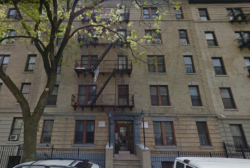
620 West 182nd Street. Image credit: GoogleMaps
HPD ordered owner to replace dangerous floor joists in residential building. In 2007 the New York City Council amended the Housing Maintenance Code and created the Alternative Enforcement Program. The Program authorized the Department of Housing Preservation and Development to conduct building wide inspections and to compel building owners to correct within four month their violations of the Housing Maintenance Code.
On February 2, 2015, HPD, as part of the Alternative Enforcement Program, inspected a Manhattan residential apartment building at 620 West 182nd Street owned by 620 West 182nd St. Heights Associates, LLC. The building had 93 outstanding violations. HPD placed the building in the Alternate Enforcement Program.
On two occasions the building’s owner asked HPD to remove 620 West 182nd Street from the Alternative Enforcement Program. HPD inspected the building after each request, found that owner had not sufficiently corrected the outstanding violations, and refused to discharge the building from the Alternative Enforcement Program. Following the last inspection HPD asserted that the building owner was required to replace waste lines, re-wire the entire building, replace floor covering in apartments, replace defective floor joists, and replace windows.
The owner filed an article 78 petition challenging HPD’s findings. The building owner, in opposition to HPD’s order, submitted the testimony of a licensed engineer who testified that in his opinion the floor joists were safe and did not need to be replaced. On July 20, 2016, Manhattan Supreme Court Justice Cynthia Kern rejected in part the owner’s petition. She ordered replacing defective floor joists, but only in apartments where violations had been found. She also upheld the orders regarding the replacement of water and waste lines. The owner appealed.
On April 18, 2017, the Appellate Division, First Department, affirmed the lower court’s decision, ruling that HPD had not been arbitrary or capricious in issuing the orders concerning the floor joists. HPD has broad discretion in evaluating pertinent factual data and inferences to be drawn therefrom. The Court ruled that the differing conclusions reached by the owner’s expert were insufficient to annul HPD’s determination. The Court could not substitute its judgment for that of the agency where the agency’s determination was supported by the record.
620 W 182nd St. Height v. HPD, 52 N.Y.S.3d 337 (1st Dep’t 2017).

